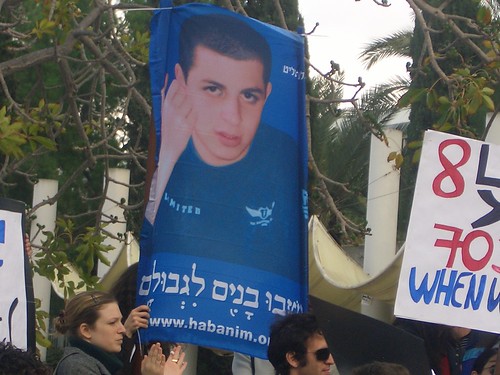 Arab media sources are reporting that a deal between Hamas and Israel for the return of Israeli soldier Gilad Shalit is in its final stages. Egyptian daily, Al Masry el Youm, cites “well-informed sources” who said that a Sunday meeting between Israeli Defense Minister Ehud Barak and Egyptian President Hosni Mubarak focused on the return of Shalit, who was captured nearly three years ago, in exchange for 1,000 Palestinian prisoners. Both the Egyptian paper and Israeli news agency Haaretz reported that Hamas leaders, particularly leader Khaled Mashaal, were showing “new found flexibility” on the issue of a swap. In order for a prisoner exchange to occur, Israel demanded that released Hamas-affiliated prisoners remain in Gaza and not return to their homes in the West Bank—a demand that Mashaal has reportedly accepted. Today, Israeli Prime Minister Benjamin Netanyahu told Likud members the return of Shalit would be a “personal responsibility.” Talks, mediated by Egypt, surrounding the return of Shalit have continued since his capture during a Hamas-led cross border raid. Barak’s meeting with Mubarak, and subsequent formation of a negotiating team, resuscitated the talks, which collapsed in February, following Netanyahu’s victory in national elections.
Arab media sources are reporting that a deal between Hamas and Israel for the return of Israeli soldier Gilad Shalit is in its final stages. Egyptian daily, Al Masry el Youm, cites “well-informed sources” who said that a Sunday meeting between Israeli Defense Minister Ehud Barak and Egyptian President Hosni Mubarak focused on the return of Shalit, who was captured nearly three years ago, in exchange for 1,000 Palestinian prisoners. Both the Egyptian paper and Israeli news agency Haaretz reported that Hamas leaders, particularly leader Khaled Mashaal, were showing “new found flexibility” on the issue of a swap. In order for a prisoner exchange to occur, Israel demanded that released Hamas-affiliated prisoners remain in Gaza and not return to their homes in the West Bank—a demand that Mashaal has reportedly accepted. Today, Israeli Prime Minister Benjamin Netanyahu told Likud members the return of Shalit would be a “personal responsibility.” Talks, mediated by Egypt, surrounding the return of Shalit have continued since his capture during a Hamas-led cross border raid. Barak’s meeting with Mubarak, and subsequent formation of a negotiating team, resuscitated the talks, which collapsed in February, following Netanyahu’s victory in national elections.
With several European embassies already providing medical assistance to Iranian demonstrators in Tehran, European Union representatives will meet on Wednesday to discuss the possibility of a coordinated aid effort. Italy, France, and Finland are the primary supporters of a more engaged policy, with the Italian government notifying its embassy over the weekend that it should assist, “where there is a request or a need for help from injured demonstrators.” The policy runs counter to views of the Obama administration and several European leaders, including Swedish and Belgian officials, who fear that involvement, even if indirect, would provide ammunition for conservative forces trying to build anti-Western sentiment to quell the uprising. On Sunday, the Iranian Foreign Ministry summoned the 27 EU ambassadors in Tehran to its offices, though the agenda of the meeting was not disclosed.
In the strongest words of caution since the breakout of protests following the June 12 elections, the Iranian Revolutionary Guard released a statement today saying that its Guards will “confront in a revolutionary way” anyone who is found protesting in Iran. The Guards, police, and plain-clothed Basij militia will produce a “decisive confrontation” to end week-long mutinies and riots, the statement warned. Such words come after a weekend of clashes between police and Reformist protesters that resulted in at least a dozen deaths and more than 400 arrests. While human rights organizations have blamed the deaths on the police and Basij, Iranian security officials have stated that “vandals” and Marxist terrorists are responsible for fueling violence in Iranian streets. Among those arrested this weekend was former President Akbar Hashemi-Rafsanjani’s daughter, Faezah Rafsanjani, who was detained for engaging in an illegal protest in Tehran. On Sunday, the Iranian Guardian Council acknowledged voting irregularities in 50 cities where the number of votes calculated surpassed the actual number of people eligible to vote. A Council spokesman called such irregularities “a normal phenomenon” because nothing legally bars people from voting in provinces where they may commute or travel, but not reside. The spokesman noted, however, that such an irregularity would only affect 3 million votes, a small dent in the landslide victory claimed by incumbent Mahmoud Ahmadinejad.

Indigenous Peruvians halted protests over land rights to the Amazon rain forest after the national Congress reversed two land laws that threatened to destroy thousands of acres of their homeland. The land laws, originally enacted as part of a free trade agreement with the United States, would have led to the deforestation of the area, endangering local lifestyles. Prime Minister Yehude Simon said more negotiations lie ahead as the government works to satisfy both the locals’ needs and the trade agreement. For weeks, blockades prevented industrial traffic and led to clashes between activists and police that killed at least 34 people. The protests that led to Congress’ 82 to 12 rejection of the laws stirred controversy domestically and strained diplomatic relations with Venezuela and Bolivia, both of which sided with the Indians. Simon announced plans to step down from office once the compromise is settled.
Somali lawmakers have called for international military assistance to deal with the country’s increasingly violent Islamic insurgency. Neighboring nations Ethiopia, Kenya, Djibouti, and Yemen were asked to intervene, with the first two already starting military maneuvers on Somalia’s vast inland border. Amidst threats that the hardline insurgents would attack Nairobi, Kenya’s Foreign Minister Moses Wetangula promised that the Kenyan government, “will not stand by and watch the situation in Somalia deteriorate.” Somalia has long welcomed international peacekeeping forces. The Ethiopian military policed the state until this past January, when its peacekeeping contract expired. On Monday, African Union officials supported Somalia’s plea as a legitimate response to the fast-moving crisis.